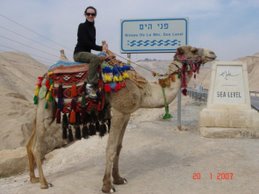For the last several days, I've been debating whether to head for another country. Maybe to Namibia to see the sand dunes, or over to Zimbabwe to raft Victoria Falls and then come back through Botswana.
Confession: I am a passport stamp junkie.
In fact, I'm disappointed that they no longer put those colorful exotic stamps on your passport. I want as many as I can get.
And realizing that has made me realize something else. We all have status symbols we revere. For some, it's Gucci shoes or a Prada handbag. For others, the opposite--a certain simplicity of wardrobe that suggests the wearer is too absorbed with the grand and lofty things of life to be bothered by something so frivolous as fashion. For me, it's the passport. A well-worn passport suggests sophistication, worldliness, a certain cultural hipness, a propensity for risk-taking.
This is as unfounded and trivial a way to judge someone as judging them by their handbag would be. Well-worn passports also suggest great privilege, both the time and money to travel the world in a way most people will only ever see in books.
It is easy to condemn other people's status symbols, but hard to own up to your own. On safari yesterday, I met a very interesting guy whom I later had dinner with. He's originally Chilean, educated in the States, and is the president of the news division of the New York Times. I like to think that I would be friends with him no matter what his station in life were, but I have to admit that I mentally checked off all the status symbols he hit (international background: check, Choate for prep school: check, Ivy League undergraduate and graduate degrees: check, well-traveled: check, and double points for the Times affiliation). And having checked them off, thought, "I could be friends with this guy." I'm not proud of that.
I didn't come to Africa to raft the Zambezi or hear Namibia's roaring dunes. I came because I think this country is at an extraordinary crossroads as it decides that kind of nation it will be and reckons with its legacy of injustice and oppression. I came to see what the church is doing. I came for the people--people who are doing everything from tentatively starting dialogues to those who are in the trenches of land reform and AIDS.
I want to go to Johannesburg and see the apartheid museum and the site of the Soweto uprising. I want to stand in the place where the Truth and Reconciliation hearings were held. I do want to see Namibia's sand dunes and Victoria Falls, and I will come back to see them. But not this time. For now, I stay in South Africa.
Subscribe to:
Post Comments (Atom)



1 comment:
I don't think there's anything wrong with checking the boxes off that say "hey, this person is where I'm from or familiar with the same things as me, I'm likely to be able to relate to them." When it veers off too heavily into expectations or judgment, though, you are right.
Post a Comment